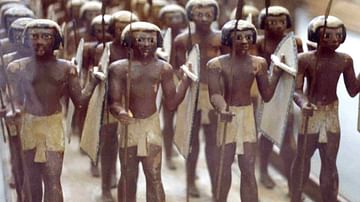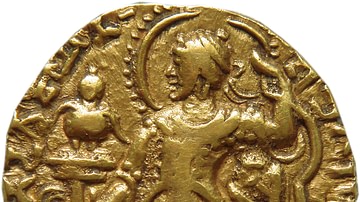Search
Did you mean: Ife?
Search Results

Article
Theseus & the Minotaur: More than a Myth?
Until Sir Arthur Evans unearthed the palace of Knossos, the half-man-half bull killed by Theseus was considered just a popular legend; archaeology changed that perception. King Minos, of Crete, fought hard with his brother to ascend the...

Article
Weapons in Ancient Egypt
The ancient Egyptian military is often imagined in modern films and other media as a heavily armed and disciplined fighting force equipped with powerful weapons. This depiction, however, is only true of the Egyptian army of the New Kingdom...

Article
Jade in Mesoamerica
Jade was a highly-esteemed material in many Mesoamerican cultures, making it a valued regional trade good and first choice for objects of religious and artistic value such as masks, ceremonial axeheads, figurines, and jewellery. Jade, because...

Definition
Hephaistos
Hephaistos (Hephaestus) was the ancient Greek god of fire, metallurgy, and crafts. He was the brilliant blacksmith of the Olympian gods, for whom he fashioned magnificent houses, armour, and ingenious devices. Hephaistos had his workshop...

Definition
Ganesha
Ganesha (also Ganesa or Ganapati) is one of the most important gods in Hinduism. Ganesha is easily recognized with his elephant head and human body, representing the soul (atman) and the physical (maya). Ganesha is the patron of writers...

Article
Gilgamesh and the Bull of Heaven
Gilgamesh and the Bull of Heaven is a Sumerian poem relating the event, now famous from The Epic of Gilgamesh, in which the goddess Inanna/Ishtar sends the celestial bull to attack Gilgamesh after he has rejected her advances. The epic changes...

Definition
Samudragupta
Samudragupta (r. 335/350 - 370/380 CE) was the first significant ruler of the Gupta Dynasty. Having come to the throne, he decided to extend the boundaries of his empire to cover the multiple kingdoms and republics that existed outside its...

Definition
Medieval Folklore
Medieval folklore is a body of work, originally transmitted orally, which was composed between the 5th and 15th centuries in Europe. Although folktales are a common attribute of every civilization, and such stories were being told by cultures...

Definition
Carnac
Carnac, located on the north-west coast of France, is the site of the largest concentration of megalithic monuments in the world. Over 100 monuments, which include burial mounds, stone tombs, enclosures, and linear arrangements of menhirs...

3D Image
Long Bladed Axe from Viking Age Birka
Long bladed axe made of iron from grave Bj 749 in Birka, Sweden. This axe dates from the Viking era: http://historiska.se/upptack-historien/object/1138773